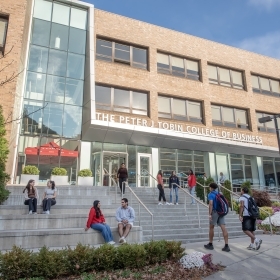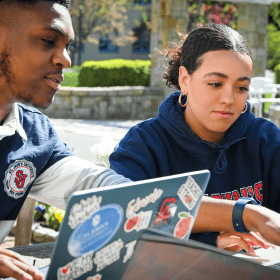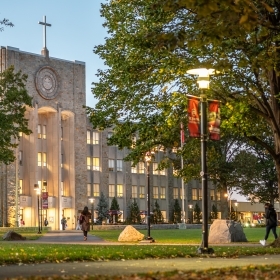7 Actionable Steps to Build a Social Service Career

As a college student, there are many opportunities to combine your passion for social services with professional growth. From service-focused clubs to social justice initiatives, universities provide pathways for students to create meaningful change.
What is Social Service?
Social service refers to organized efforts aimed at helping individuals, communities, or society, particularly those who are disadvantaged or marginalized. Careers in social service typically focus on improving the quality of life for others by addressing issues like poverty, health care, education, and social justice.
In this guide, we explore six actionable steps you can take to shape your career while making an impact, with St. John’s University serving as a prime example of how to get started.
Step 1: Choose a University with a Mission that Matches Your Goals.
When considering colleges, choose those whose mission aligns with your values and career ambitions. For example, St. John’s University is rooted in the Vincentian tradition, which emphasizes service to marginalized communities. This provides an excellent foundation for students interested in careers in social work, public health, nonprofit management, and international development.
Bonus tip: Connect with an Academic Adviser.
When researching colleges, you can connect with academic advisers to learn more about potential careers and explore which programs would be a good fit for your goals.
Get to Know the Types of Social Service Careers.
Careers in social service can span a variety of sectors, allowing individuals to focus on areas where they feel they can make the most impact. Some of the most common types of social service careers include
Social Work: Helping individuals and families overcome challenges related to mental health, poverty, domestic violence, and more. Social workers often provide counseling, resources, and advocacy.
Public Health Professional: Working to improve health outcomes in communities, particularly for marginalized populations, by addressing issues like health equity, access to care, and public health education.
Nonprofit Management: Leading organizations dedicated to social causes such as education, poverty alleviation, and environmental sustainability.
Human Rights Advocate: Defending and promoting the rights of individuals and groups who face discrimination or oppression on local, national, or global levels.
Sustainability Officer: Focused on promoting environmentally sustainable practices within communities, businesses, or governments, focusing on long-term environmental stewardship.
Community Development Specialist: Working with communities to address socioeconomic challenges, improve public spaces, and enhance quality of life through localized initiatives.
Policy Analyst: Shaping policies that impact social services, public health, and justice systems by conducting research, developing strategies, and advocating for change at various governmental levels.
Global Development Worker: Addressing international issues such as poverty, education access, and health care in developing countries through projects focused on sustainable development.
Step 2: Apply for Scholarships that Support Social Impact Work.
Securing scholarships that fund your education can also connect you to networks and experiences that shape your career in service-oriented fields. For example, the Ozanam Scholars program at St. John’s provides financial aid and hands-on community service projects directly aligned with careers in social service. Scholars get to work on real-world projects that have an immediate impact, giving them valuable experience they can apply to future roles.
Step 3: Select Academic Programs that Focus on Social Impact.
Choosing the right major or academic program can help guide you toward a social service career. St. John’s offers several programs that directly support careers focused on making an impact. These programs include, but are not limited to,
Global Development and Social Justice (M.A.): Focuses on combining theoretical study with practical application, preparing students to tackle global inequalities and promote sustainable development.
Sustainability (M.B.A.): Focuses on sustainable business practices and ethical decision-making, blending environmental stewardship with economic growth strategies.
Critical Race and Ethnic Studies (B.A.): This program examines the intersections of race, ethnicity, and power, equipping students with the tools to address racial injustice in various sectors.
Criminal Justice/Sociology (B.S./M.A.): Focusing on the social aspects of crime, justice, and reform.
Public Health (M.P.H.): Prepares students to address health disparities and improve community health outcomes, with a strong focus on social justice in health care.
Global Development and Sustainability (B.A.): An undergraduate program that prepares students to address pressing global challenges through a multidisciplinary approach.
Health and Human Services (B.S.): Focuses on improving the quality of life for individuals and communities, emphasizing service and advocacy.
Step 4: Explore Courses that Offer Experiential Learning Opportunities.
Beyond traditional academic study, experiential learning allows you to apply classroom knowledge to real-world challenges, making it an essential part of career preparation.
At St. John’s University, programs like the Global Loan for Budding Entrepreneurs program at The Peter J. Tobin College of Business allow students to help address economic challenges like poverty and empower students to contribute to sustainable economic growth. Through such hands-on projects, students apply their academic knowledge to real-world social impact, gaining valuable skills in problem-solving, communication, and ethical leadership.
Step 5: Explore Volunteer Service Opportunities.
Volunteer service and immersive learning experiences are essential in developing the skills and perspectives needed for a career in social service. St. John’s University offers many opportunities for students to engage in meaningful service. Programs like the Plunge Program, a week-long service immersion experience, allow students to explore various social justice issues such as poverty, environmental justice, and migration.
Tip: When choosing volunteer opportunities, focus on those that align with your career interests. Real-world service experiences are often the foundation for developing leadership and problem-solving skills highly valued in service-oriented careers.
Step 6: Join a Service-Based Society or Club on Campus.
Getting involved in service-based societies or clubs is an excellent way to connect with peers who share your passion for social service. These groups can provide leadership opportunities, build your network, and give you hands-on experience creating positive change.
St. John’s University students can join societies like the St. Vincent de Paul Society (SVDP), which offers an opportunity to combine faith and service in line with the University’s Vincentian tradition. The SVDP focuses on direct and indirect service, encouraging students to apply Vincentian values to address social injustices.
Step 7: Learn from Student Success Stories.
As you prepare for your service and social action career, one of the best ways to find inspiration is by exploring how other students have succeeded. Learning from real student experiences gives you a clear idea of how universities like St. John’s support their students in making a tangible impact through service and social action.
St. John’s Student Success Stories
- Ozanam Scholar Finds Growth and Adventure at St. John’s
- Student Sees Possibilities in Urban Ecology and Sustainability
- Psychology Student Is an Advocate for the Overlooked
Choose the Right University to Drive Your Passion for Social Impact.
By exploring these avenues as an incoming student, you can find a university that supports your academic and career goals and empowers you to be a force for good in the world.
St. John’s University is a prime example of how students can engage with social action and service, providing a powerful platform for those eager to make a difference.
As you consider your college options, remember that the right university will offer you the tools, opportunities, and support needed to turn your passion for service into meaningful action.







